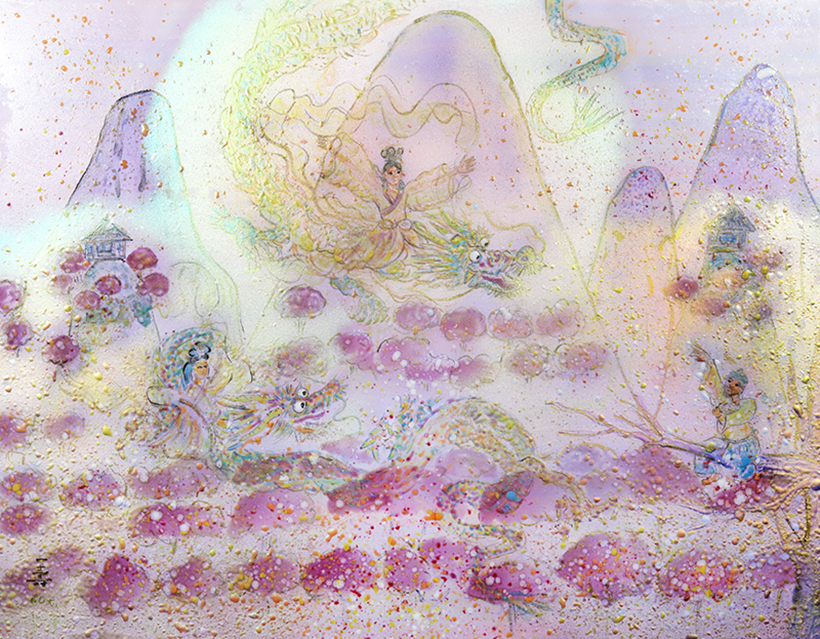2021.02.05
Introduction of work “Juka”
category:Works and Goods

“During Jin’s time in China, a fisherman strayed into a forest full of peach blossoms as he went down along the valley in a boat.
Stunned by the dreamy beautiful view, the fisherman kept paddling to reach the source of the water and found a cave with a faint light at a dominant mountain.
He left the boat and went through the cave and there, he found a quiet peaceful village.
Rich land, beautiful nature, gentle livestocks.
The villagers welcome the unexpected stranger invite him to their houses.
Villagers say, their ancestors arrived here after the death of Qin Shi Huang, Qin’s first emperor, hating the turbulent world and have been quietly hiding here since then.
They were separated from the outside world, and they were living peacefully and freely without knowing the changes in periods.
After a few days of staying, the fisherman left the village and told people what he had seen and heard.
Everyone was excited to go to the village like a paradise of the world, but no one found it again.
This is a synopsis of ‘The Peach Blossom Spring’ by Tao Yuanming which is the origin of Tougenkyo(paradise on earth).
In general, “Tougenkyo” is said to mean ideal world and is adjacent to the reality while “utopia” is “a perfect society that does not exist in reality”.
It is not a place like the world of gods and spirits which separates from the real world.
And what is described as a hidden village is by no means a special sight, but a peaceful but very ordinary village.
There seem to be various theories on how to interpret this, but I think that Tougenkyo means that it is something you can have depending on how you think and not something you seek outside.
It is to cherish the ordinary life, and to cherish the work of this life which is alive.
Of course, reality is not always smoothsailing.
There are difficulties, pains, and sadnesses that make you want to close your mind.
However, because it is a reality that has such darkness, life shines even stronger.
“Juka” represents our life itself that illuminates the darkness, the strength to smile without being defeat by difficulties, and the heart to cherish everyday life and reality.
What Kazuhisa Kusaba has been pursuing for a long time was how to express such joy of living and the brilliance of life.
At the milestone of the 60th birthday of the artist Kusaba, he returned to the origin and produced a series of sparkling glazes that pursued “brilliance”, and “Juka” is one of them.
When I worked on this work, I thought about life, rebirth, and soul.
I think that the way of living fulfilling your own duty lies in a different dimension from just to live as a body.
It is to live with improvement facing the question, “What do I live for?”, not to satisfy your desire materially and just to “consume” your life aimlessly.
That is what really makes life shine and is to live truly freely, and it brings the happiness of a soul that is fundamentally different from the suffering of the body.
The 60th birthday is a milestone for rebirth in Japan, but everybody can ask themselves and review the question, “what do we live for?” anytime, and in that sense we can be reborn every day and renew the brilliance of life.
In “Juka”, I expressed my determination to repeat the work of the soul and to shine with Tougenkyo in my mind all the time.
And this work with the determination has been reproduced with a new technology called Digital Screen Polarized Pearl color.
It is very difficult to express the brilliance and color of Tosaiga on paper, but new technology using special ink and elaborate techniques has succeeded in expressing the fine sparkle of “Juka”.
In addition, the change in colors due to the angel brought by the particles of light, which is one of the characteristics of this technique, appeared like a peachy fog in this work.
Behind the peachy fog, the dragons play in the sparkling light, fairies dance, and Hanasaka-jiisan (the old man who made cherry flowers bloom in one of japanese famous folktales.) creates new lives by scattering petals.
The work resulted in like the impression itself received from the word “Tougenkyo”.
One of researchers of Tao Yuanming says that the lyrics of “Itsumo Nanndodemo (Always Many Times)”, the theme song of the movie “Spirited Away” are good interpretations of “Tougenkyo”.
I won’t search over the sea anymore
Sparkles, they are always here
Because I found them within me
We hope that you will enjoy the digital screen polarized pearl color “Juka” at hand as a work that will help you to re-question the meaning of living and find the seeds of happiness inside you.
Kazuhisa Kusaba Studio
